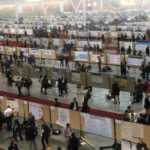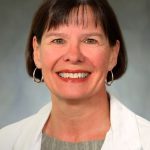The 2007 ACR/ARHP Scientific Meeting will offer pioneering research, outstanding clinical sessions, innovative special-interest forums, and increased opportunities for interaction. The 2007 program includes greater variety and more concurrent sessions than ever before and remains the most comprehensive and diverse international gathering of physicians, scientists, and healthcare professionals devoted to rheumatology.
Basic Science Goes To Boston
The ACR/ARHP Annual Meeting Planning Committee (AMPC) is providing a broad selection of basic science for the 2007 Annual Scientific Meeting in Boston this November. The AMPC remains focused on keeping basic researchers ahead of the curve and expects this year’s meeting to bring more translational components to both clinical and basic science symposia.
“There is a mixture of hot and emerging topics, such as ion channels and bioimaging,” explains Brian F. Mandell, MD, PhD, chair of the AMPC, “as well as up-to-date reviews of topics that are of increasingly broad interest.”
The AMPC is using more translational components as a way of increasing the basic scientist’s interaction with clinicians, he explains. In keeping with this, the meeting will offer sessions on osteoclasts, implications for the development and treatment of osteoarthritis, T-cell subsets, and a year in review – all of which will be of interest to both the clinician and the basic researcher.
Dr. Mandell is particularly excited about the speakers in this year’s program. “We have several truly high-visibility speakers, and we have expanded the venue for several of our rheumatology research award winners,” he says. “We are extremely fortunate to have Dr. Philip Sharp, a Nobel Laureate, delivering a talk on microRNAs, and Dr. Judah Folkman, a legendary researcher in angiogenesis, presenting an introductory talk at our abstract mini-symposium on angiogenesis, cell to cell adhesion, migration, and vascular biology in arthritis and inflammation.”
Additionally, the recipient of the Arthritis Foundation’s Lee C. Howley, Sr. Prize for Arthritis Research, Gary Firestein, MD, will introduce a mini-symposium, “RA Pathogenesis: Molecular Mechanisms” with a lecture on new therapeutic targets in RA.
The AMPC has also invited the ACR Research and Education Foundation (REF) lecture recipients, Judith James, MD; Regis O’Keefe, MD, PhD; Steven L. Teitelbaum, MD; and Paul H. Plotz, MD, in the areas of lupus, orthopedics, bone research, and research contributions to rheumatology, respectively, to present lectures within sessions of related areas.Enhanced Opportunities at the 2007 Meeting
The 2007 ACR/ARHP Scientific Meeting will offer pioneering research, outstanding clinical sessions, innovative special-interest forums, and increased opportunities for interaction. The 2007 program includes greater variety and more concurrent sessions than ever before and remains the most comprehensive and diverse international gathering of physicians, scientists, and healthcare professionals devoted to rheumatology.
Basic Science Goes To Boston
The ACR/ARHP Annual Meeting Planning Committee (AMPC) is providing a broad selection of basic science for the 2007 Annual Scientific Meeting in Boston this November. The AMPC remains focused on keeping basic researchers ahead of the curve and expects this year’s meeting to bring more translational components to both clinical and basic science symposia.
“There is a mixture of hot and emerging topics, such as ion channels and bioimaging,” explains Brian F. Mandell, MD, PhD, chair of the AMPC, “as well as up-to-date reviews of topics that are of increasingly broad interest.”
The AMPC is using more translational components as a way of increasing the basic scientist’s interaction with clinicians, he explains. In keeping with this, the meeting will offer sessions on osteoclasts, implications for the development and treatment of osteoarthritis, T-cell subsets, and a year in review – all of which will be of interest to both the clinician and the basic researcher.
Dr. Mandell is particularly excited about the speakers in this year’s program. “We have several truly high-visibility speakers, and we have expanded the venue for several of our rheumatology research award winners,” he says. “We are extremely fortunate to have Dr. Philip Sharp, a Nobel Laureate, delivering a talk on microRNAs, and Dr. Judah Folkman, a legendary researcher in angiogenesis, presenting an introductory talk at our abstract mini-symposium on angiogenesis, cell to cell adhesion, migration, and vascular biology in arthritis and inflammation.”
Additionally, the recipient of the Arthritis Foundation’s Lee C. Howley, Sr. Prize for Arthritis Research, Gary Firestein, MD, will introduce a mini-symposium, “RA Pathogenesis: Molecular Mechanisms” with a lecture on new therapeutic targets in RA.
The AMPC has also invited the ACR Research and Education Foundation (REF) lecture recipients, Judith James, MD; Regis O’Keefe, MD, PhD; Steven L. Teitelbaum, MD; and Paul H. Plotz, MD, in the areas of lupus, orthopedics, bone research, and research contributions to rheumatology, respectively, to present lectures within sessions of related areas.
“This should provide enjoyable and instructive sessions for senior researchers and novices alike,” says Dr. Mandell.
To maximize opportunity, attendees will be able to participate in sessions without missing other topics of interest running concurrently. “We plan for the first time to offer taped replays of the clinical sessions in our encore theater,” notes Dr. Mandell. “We hope this will enable clinicians who also have basic science interest to attend the science sessions in person, participating in the live dialogue, without missing out on their clinical reviews.”
With the basic science symposia, state-of-the-art lectures, and additional opportunities to interact with clinicians, basic researchers will have a packed schedule at this year’s meeting. For more information on the Annual Scientific Meeting, visit www.rheumatology.org/annual.
CORC Forum Will Focus on Practice Support
Faced with the incredibly complex and rapidly changing field of rheumatology, practicing physicians need tools to build stronger, more profitable practices. To meet this need, the ACR is gathering leading healthcare specialists at the ACR Committee on Rheumatologic Care (CORC) Forum during this year’s annual meeting. The forum, “Building a Stronger Physician Practice,” will take place on Friday, November 9, from 2:30–4 p.m., and will cover:
- Purchasing malpractice insurance;
- Using clinical research studies to increase your bottom line; and
- Increasing profitability by integrating nurse practitioners and physician’s assistants into a rheumatology practice.
The forum speakers are experts in their fields and will share their knowledge and experiences in an informal and comfortable setting. Scheduled speaker Robert Conroy is a veteran presenter at the ACR annual meetings and is recognized as an authority on healthcare law. Conroy is the former chief of New York City’s Medical Malpractice Unit and founding director of the New Jersey State Bar Association’s Health and Hospital Law Section. Conroy’s presentation will focus on the Medicare audit process, ways to respond, and your rights when faced with an audit.
According to CORC Chair Eileen Moynihan, MD, CORC’s goal is to ensure continuous practice support. CORC “has worked diligently to create this informative forum for practicing physicians,” she says. “We strongly believe that these topics will be relevant to the ACR membership at large.”
For more information, contact Antanya Chung, CPC, CCP, ACR director of practice management, at (404) 633-3777 ext. 818 or [email protected].
Completing the Puzzle:
2007 ARHP Clinical Focus Course
When doing a jigsaw puzzle, a person will work – piece by piece – to complete the task. As each piece fits into the proper place, the puzzle solver gains a clearer picture of the final outcome. This picture keeps the puzzle solver coming back for more.
One of the factors that draws health professionals to rheumatology is that the diagnosis is not always immediately evident. Obtaining history, performing physical exams, collecting and reviewing data, and communicating with the patient provide just a few of the pieces of the puzzle clinicians must put together when serving those who have rheumatic conditions. Collecting puzzle pieces involves more than the musculoskeletal system. In fact, all organ systems must be considered.
The 2006 Annual Scientific Meeting included lectures reviewing the cardiovascular, pulmonary, renal, neurologic, ophthalmic, and dermatologic aspects of rheumatic disease. Based on attendee feedback, the 2007 course, “Completing the Puzzle: Other Aspects of Rheumatic Diseases,” was developed to follow the same pattern and will benefit those rheumatology puzzle solvers who want to enhance their knowledge and improve their care of both adult and pediatric patients with rheumatic diseases.
The course was specifically designed for nurses, nurse practitioners, and physician assistants, but all interested clinicians are invited to attend.
By completing this course, attendees should gain knowledge to help them put together their patient puzzle, including learning to recognize clinical manifestations and complications, select appropriate laboratory and radiographic studies, analyze data, and propose, apply, and manage pharmacologic and non-pharmacologic treatments for rheumatic diseases.
In addition, CME and Certificate of Participation credit is being offered for the first time to those who attend.
The course will be held Wednesday, November 7, from 7:30 a.m. – 4:30 p.m. Because this is a pre-conference course, there is an additional fee for participation. To register, visit www.rheumatology.org/arhp/index.asp.
With the return of attendee favorites and the addition of new sessions and features, the 2007 ACR/ARHP Scientific Meeting is the premier event for specialists in the field of rheumatology. For more information and to learn how you can join an estimated 10,000 professionals in Boston November 6–11, visit www.rheumatology.org/annual.


